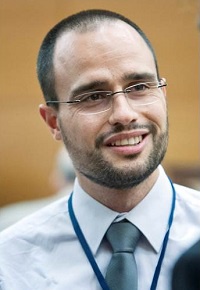Last Thursday, October 26, the European Parliament awarded the Sakharov Prize for Freedom of Thought to the political opposition in Venezuela and the country's political prisoners. The Sakharov Prize, which was established in December 1988 by the European Parliament and was named in honor of the Soviet physicist and political dissident Andrei Shakharov, honors those who defend human rights and freedom of thought. This year’s award went to the National Assembly of Venezuela, led by Julio Borges, as well as “all political prisoners.”
“This prize not only recognises the democratic opposition of Venezuela‘s courageous struggle – the European Parliament also wants to express its proximity to and pay tribute to the Venezuelan people: to all those who have been unjustly jailed for expressing their opinion, to those struggling to survive on a daily basis because of a brutal regime, to those families in mourning because they have lost loved ones in months of uninterrupted protests for freedom,” said the president of the European Parliament, Antonio Tajani.
“Venezuela is experiencing a political crisis. The ruling party steadily limited the rule of law, and in March 2017 the Supreme Court of the country deprived the democratically elected national assembly of the legislature,” he said. “According to the latest report of Foro Penal Venezolano (Venezuelan Criminal Forum), the number of political prisoners is now more than 600 people. Among them are the opposition leaders Leopoldo Lopez, Antonio Ledesma, Daniel Ceballos, Jon Goicochea, Loren Saleh, Alfredo Ramos and Andrea Gonzalez.”
During the speech, he reiterated “our total support for the National Assembly of Venezuela, a democratically elected parliament, the only parliament democratically elected.”
The EP president had particularly harsh words for Venezuela’s socialist president, Nicolás Maduro. “He is a dictator,” he said. “We cannot remain silent. … We must defend democracy, freedom and human rights.”
During Tajani’s speech, the European parliament’s left-wing parties represented by the European United Left-Nordic Green Left (GUE/NGL), which includes Germany’s Die Linke, Ireland’s Sinn Fein, and Greece’s ruling Syriza Party contested him. The members laughed and said that the decision was politically charged – so it would boycott the formal awards ceremony. Nevertheless, Tajani proceeded with his speech and said that we shouldn’t laugh when so many innocent Venezuelans die every day. Too many are imprisoned or die of starvation.
Tajani was supported by Guy Verhofstadt, a Belgian politician who has served as the leader of the Alliance of Liberals and Democrats for Europe Group. Verhofstadt, who has been a Member of European Parliament since 2009, is perhaps best known for coordinating the EU’s response to Brexit. “This award supports the fight of democratic forces for a democratic Venezuela,” he said, urging “the international community to join us in this fight for the freedom of the people of Venezuela.”
This prize, which is also accompanied by a monetary award of €50,000 ($58,000 U.S., or £45,000), will be formally awarded on December 13 in Strasbourg, France.
Other nominees this year include a Pakistani Christian woman who has been on death row for six years; a human rights defender in Guatemala, Aura Lolita Chavez; two pro-Kurdish prisoners in Turkey; a Burundian human rights activist; and a Swedish-Eritrean playwright long held in Eritrea, Dawit Isaak.
The winner follows the footsteps of the last year’s winners, Nadia Murad and Lamiya Aji Bashar, two Yazidi women who escaped from sexual trafficking by ISIS. Every year, a short list of nominees is drawn up by the Committee on Development and Committee on Foreign Affairs, and the winner is named in October. Many former Sakharov laureates also endured political oppression, including: Xanana Gusmão (1999), the Belarusian Association of Journalists (2004), Damas de Blanco (2005), Alaksandar Milinkievič (2006), Hu Jia (2008), Razan Zaitouneh (2011), Nasrin Sotoudeh and Jafar Panahi (2012), and Guillermo Fariñas (2010), among others.
The European Parliament is right to draw our attention to human rights abuses in Venezuela. Every day, we see on the news people dying from hunger or suffering massive deprivation. For example Cristina, a 60-year-old translator and conference producer from Caracas, said: “I have not been able to get milk, sugar or cornflour in about four or five months. Toilet paper is an issue, as well as soap and deodorant. I refuse to buy these products from the bachaqueros, since I consider them crooks.” As we can see in her testimony, Venezuelans are being deprived of basic needs. Freedom of speech is a human right, as well. Yet Bolivarian socialism has been supported by Jeremy Corbyn and Noam Chomsky.
Venezuela’s opposition heroically demonstrates its commitment to promoting justice, freedom, human rights and human dignity – among the core principles of Acton Institute. Prizes of this sort exhibit the important virtue of bestowing honor on the worthy. This award deserves the support and praise of those who honor liberty across the transatlantic sphere.
(Photo credit: © European Union 2017 - Source : EP. Used with permission.)




